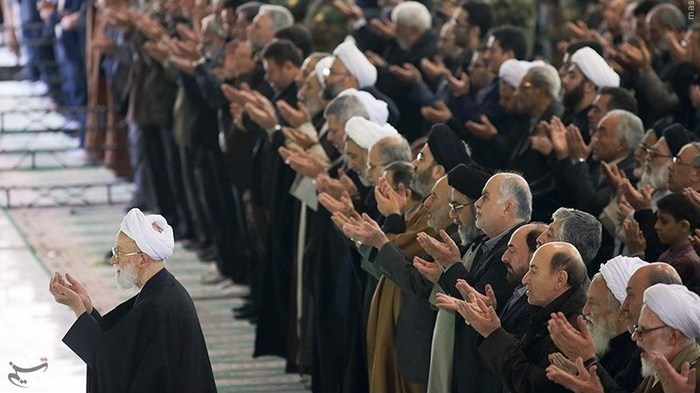Iran’s Friday Prayers: The glory of Arbaeen

(Ayatollah Emami Kashani performs the Friday prayers. Photo: Mohammad Akhlaghi/Tasnim)
Friday prayers of this week in Iran concentrated on various themes, the most important of them the Arbaeen ceremony held in the city of Karbala, Iraq. Arbaeen marks the fortieth day after the anniversary of the martyrdom of the third Shia Imam, Hussein, by the Caliph of the time, Yazid, in Iraq in the 7th century.
In Tehran, the soft-spoken Ayatollah Emami Kashani served as the leader of Friday prayers. Emami Kashani thanked the government of Iraq for establishing security for Arbaeen, which according to one source was observed by around twenty-six million pilgrims. He also seized the opportunity to compare the handling of Arbaeen with the Saudis’ handling of the Hajj ceremony and slammed the “medieval rulers” of Riyadh for the “fiasco” they caused this year during the Mina rituals.
Emami Kashani also addressed Ayatollah Khamenei’s letter to the Western youth. “The reason that the Leadership began his letter with France [recent terrorist attacks] and referred to this incident is to announce that the Muslim world is sad because of this incident, regardless of whether the French are Muslims or not. They are human after all,” said Emami Kashani. He also added that the West has been suffering from a paradox, “on the one hand it says it is against ISIS and terrorism, and on the other hand, it supports the state terrorism of Israel and helps terrorist groups such as ISIS.”
Ayatollah Alamolhoda in Mashad called the Arbaeen pilgrimage an encounter between two interpretations of Islam, the American Islam (a term first used by Ayatollah Khomeini), which is Islam stripped of its revolutionary characteristics, and “Husseini” Islam, an Islam which is orientated towards reform and revival of the faith. Alamolhoda called the event “a sign of the power of Islam and Shia.”
In Isfahan, in central Iran, Ayatollah Tabatabaeinejad focused on the upcoming elections for the Council of Experts, an elective body of senior clerics which is in charge of selecting Iran’s Supreme Leader and supervising his conduct. Tabatabaeinejad asked his congregation not to follow partisan lines in electing their representative in the Council and not elect “weak and undeserving” candidates.
Also in Tabriz, in the northwest of Iran, the Friday prayers’ leader warned about the parliamentary elections slated for February 2016. Mojtahed Shabestari criticized those who argue against the Guardian Council’s discarding of ineligible candidates, calling their words against the letter of Quran and the Islamic culture. He warned about the formation of a parliament similar to the (Reformist-dominated) Sixth Parliament of 2000-2004.
In Yasouj, in the southwest of Iran, the sermonizer Hojjatoleslam Mousavi warned about ‘infiltration’, this time by “false-hearted” academicians of the universities who serve as a channel to transfer the “enemies’ plans” to students. “The 2009 Fetneh (Sedition) was instigated by the very same … false-hearted university academicians,” Mousavi said.

